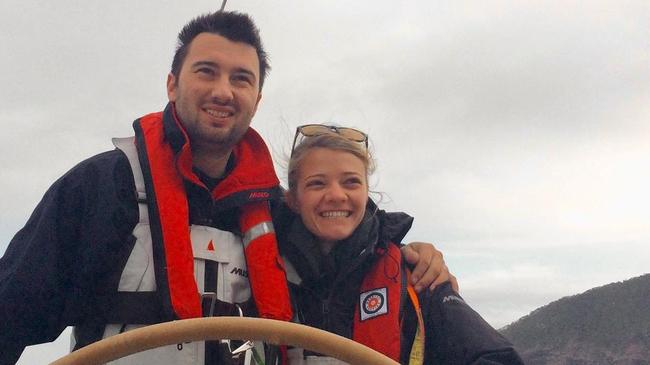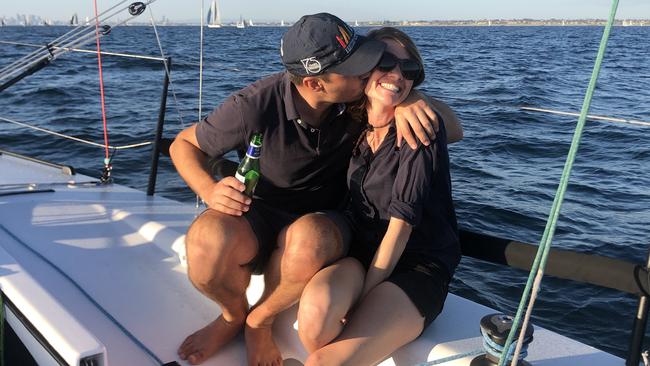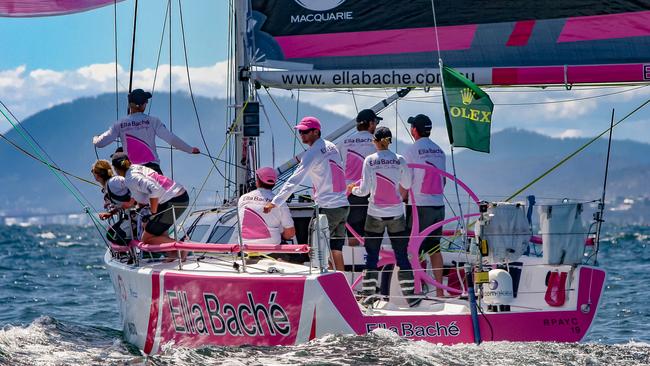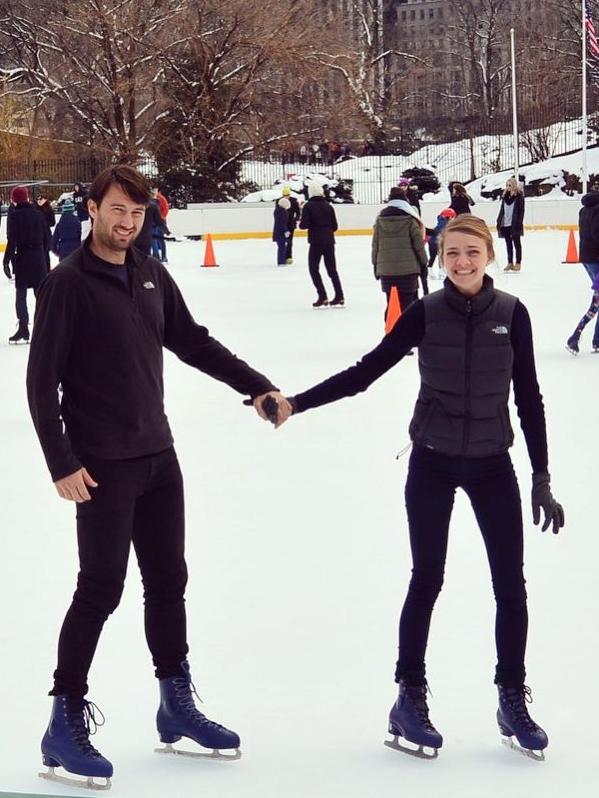Sailor Jessica Watson on life after the sudden death of her partner, Cameron Dale
She’s faced towering waves and a media storm after her solo sail around the world aged just 16. But Jessica Watson reveals that was nothing compared to the courage it’s taken to fight back after suddenly losing the love of her life.

Jessica Watson sailed solo around the world aged 16, in 2010. The following year she met the love of her life, Cameron Dale, while competing in the Rolex Sydney to Hobart Race. In August last year, aged 29, Cam died of a stroke – the result of undiagnosed high blood pressure. Here, Jessica opens up for the first time about their blissful 10 years together, the dark thoughts she experienced in the depths of grief – and how she fought her way back into life.
–
What do you say to someone as they take their last breaths? I’d said everything I could think to say in the nearly six weeks we’d spent in hospital. I told Cam again and again that he’d always be with us, that I loved him. There didn’t seem to be anything more profound to say than “I love you”. Over the years Cam had said those simple words to me so often, or written them in texts out of the blue; occasionally, he would mischievously yell them across the road after he’d dropped me at the train station.
To try to summarise our time together and, most importantly, who Cam was, is impossible – there’s so much – and I won’t try. Cam would be happy to be remembered by all who loved and knew him. I’m grateful that I can’t ever forget him; he’s part of the way I experience the world, my love for him as irrevocably part of me as the powerful, utterly horrific moment he slipped away.

After his death I was cocooned in shock. I was doing things, often constructive, normal things, while crying lots and hurting horrendously. But I realise now that it took months to fully comprehend what had happened. It seems the human brain – or at least my assaulted one – simply couldn’t wrap itself around something of that magnitude in a short space of time. It took months for the pain, already raging, raw and jagged, to become unbearable. I’d been going around saying things like, “It’s better to have loved and lost than not loved at all”, but I was kidding myself, I wasn’t prepared for how bad it could get. How black and how terrifying it would be to realise that nothing, nowhere and not even time could fully lessen the intensity of what I was starting to feel. To fully comprehend that Cam was gone was too much. Just recalling those moments now sets my eyes splashing water on my notebook and my nose streaming with snot – it’s not glamorous, this crying business.
I suppose the emotion is intense grief or anguish, but neither of those words seems adequate. Whatever it is, in the worst of moments, it’s so acute. And alongside the intensity of that pain and the terror of realising it will always be with me was a seeping, all-invading sense of, “What’s the point?” So many years into a relationship that we’d intended to be forever – my purpose had become intertwined as an “us”.
There are so many different ways I experience the grief: the ache in the chest, the sickness in the stomach, the constant missing him, the confusion of the lost “we”, the loss of an assumed future and our imagined baby. Oh, all the different types of bad … there’s no shortage of them. The unstoppable streaming of tears, the constant misting of eyes, the public crying, the much, much private crying (seriously, dehydration is a concern), the heart palpitations, the panic attacks, I could go on.
But perhaps one of the most poignant ways I experience grief is what I can best describe as the loss of a dimension. To love Cam fully over a long period of time was, for me, to experience a little of how he experienced life. To see what the world looked like to him, to feel the ups and downs through his eyes. It’s a little like being in two places at once, with more than just your own first-hand experience of the world. When that’s removed, there’s a flatness, a one-dimensionality to living.

Together, all these things left me feeling something that completely shocked me – not wanting to be alive, not wanting to exist in a world where Cam wasn’t, where pain could be this bad and where I couldn’t imagine it lessening. It was never that I wasn’t grateful for how much I have, it’s just that the agony can be that intense.
It took work, incredible support and time to be able to reassure myself that I didn’t want to act on these thoughts – and to trust myself and build a habit of sorts that in the worst moments I’d reach out, pick up the phone and get talking or moving or walking. I’m not sure those beautiful people on the end of the phone realised how badly I needed them as we talked about anything, whatever, as the endorphins of moving or the comfort of being near the water did their work. I am lucky that so many people told me they were there if I needed them. That simple thing we say to someone struggling, “Call anytime”, can be a lifesaver. I get it now. I understand just how important it is.
Sailing gave me a powerful desire to want to be alive
And for anyone who thinks “I don’t know what to say”, it’s not about saying anything or doing anything. It’s just that by being there you can help someone shoulder just a little of the pain. My little sister’s birthday was during the time Cam was in hospital, and a call to wish her happy birthday quickly disintegrated into me blubbering, then apologising for blubbering, and her firmly telling me off for apologising. She explained that some things are too big to bear alone and have to be shared. That little bit of wisdom was such a big part of learning to reach out in my worst of moments, to lean on others when I needed. Through some of the toughest days, those closest to me were like a life-ring around my neck. Keeping my head just above the water to allow my legs to keep kicking.
It was useful to be able to tell myself, too, that I’d never not faced up to anything, whether that be towering waves alone in the Southern Ocean or fronting up to a media storm after running into a 63,000-tonne ship at sea. Cam’s death was of course completely new, alien territory, and I didn’t know who I was in this new world where unimaginable things happened. But I was able to tell myself that my default setting was to keep moving, that maybe I could rely on the mental “muscle memory” of perseverance while my head reeled.
Being shocked and scared by the dark thoughts I was having – and not wanting to inflict pain on those who loved me – was the catalyst for knowing I needed to get better. I started a very deliberate effort to “seek the good”. The idea of “aggressively doing things that help” became, and still is, my mantra. I recognise how privileged I am to have been able to apply that philosophy and cram my life full of things that help, and by that I also mean things like regular time to process (aka cry).
There have been so many moments of good that I clung to and built on. One of the first was actually during those numb, hideous, exhausted, grey weeks of Cam’s time in hospital. Food didn’t have taste, warmth didn’t bring feeling, his prognosis couldn’t have been bleaker. I remember looking out the car window on the way to the hospital and being struck by the sight of the late afternoon sun on the water. I can still see it so clearly, the sparkle of harshly reflected light on the choppy deep-blue surface. “How can there still be beauty, how can I still see it?”, I thought then. I am still baffled by that question now.
It was also early on that I began to properly understand, for the first time in my life, the importance and true pleasure of good company. At first it was the hum of conversation, often around me when I didn’t feel like engaging and, as time’s gone on, I can’t tell you how much I enjoy a conversation with a friend or a kind or interesting acquaintance.
I certainly didn’t have to work hard to see an army of good people. My family and so many friends’ capacity for kindness has been a little awe-inspiring to me. There is something so beautiful in acts like friends dropping everything to sit on the other side of a hospital wall while I had a silent meltdown in the emergency department, filling a face-mask with snot while crying and wasting the poor overburdened health system’s time to diagnose nothing more than a panic attack.

Then there’s the kindness of strangers, the guy who gave me tissues on a train, the cleaner who wishes me an extra warm goodnight as I’m leaving the office to face what is still often the black terror of going home to a place without Cam. The extra chocolate freckle with my coffee. Again, I could go on and on. There are so many good people and such beauty in these little things that I feel so deeply at my most vulnerable times.
There is the satisfaction of hard work, the pleasure of fitness and health, yoga, the beauty of nature, the adventure of travel, a warm breeze or a stimulating sharp cold wind. The joy of being able to do something nice for someone. Floating in warm salty water, stuffing myself with delicious food. My crazy little two-year-old niece dragging every adult up to dance to the Bluey theme song.
I found solace, too, in long days on the water, immersed in wind and waves, sailing fast and slightly out of control. Being part of a crew that Cam still seems so much a part of, having these adventures to look forward to. There’s something so good about being covered in bruises, muscles sore and face wind-burnt but, of course, it’s the people onboard, Cam’s mates, who have made sailing so incredibly good. I’m not sure I’ve found the words to explain how wonderful sailing has been, and perhaps that’s because I don’t need to. There’s a shared sense of it among those on board.
“I’ve been called courageous for my sailing exploits – but the courage it’s taken to get through this is incomparable”
There have been so many good things (believe me, my niece is quite something), but of all of them, it was sailing that gave me a powerful desire to want to be alive. A particular moment that stands out vividly is one of slight chaos after we’d just broken something. Full of adrenalin, I found myself, no doubt looking like a dork in Cam’s oversized hat, furiously trying to bail water out of the boat, everyone laughing at me as waves dumped over me and straight back into the cabin. Perhaps it isn’t everyone’s cup of tea, but I’m still savouring that moment and the revelation it gave me – a sense of being glad to be living.
Another moment was during a sailing regatta, a tribute in the week before the first anniversary of Cam’s passing. I did something I couldn’t have imagined I’d ever do again. One night, still wearing my salty sailing gear, fortified by a number of beers (OK, and rums) and a good band, I found myself on the dance floor, surrounded firmly on every side by crewmates wearing shirts featuring a homage to Cam and one of my best mates who has a sunshine personality. Beyond us were a sea of happy sailors. My eyes streamed with the intensity of the emotion, the acute joy of living, alongside the raw pain of Cam not physically being there, yet being so much a part of it. Of just how good, how special that moment was.
What started as an effort to see beauty and kindness built over time into something that is as surprising to me as how bad the bad can be. It is, simply, an acute appreciation for “the good”. Perhaps this isn’t groundbreaking to you but, for me, it is extraordinary. A very unexpected number of the tears that I’ve cried in the past year have been as a result of being overwhelmed by so much that is good.

There are people who have tried to assure me that I needn’t feel guilty if I have moments of feeling OK, or moments of enjoying myself. A kind notion, but guilt for experiencing anything positive isn’t something to waste energy on. I know the depth of the pain. I carry and live it constantly, even while smiling. I know how much I loved Cam, and he knew it too. There is absolutely no need to add to the pile of bad emotions. I also have to believe that a little of Cam is now part of everyone who loved him, so not to embrace the good when I can feels like doing wrong by him.
I have learnt that when the things you fear the most happen, and somehow – held up by those around you, in my case by Cam’s love and by what turned out to be a well-stocked mental toolkit – you’re still standing, able to appreciate the good and at times feel it acutely, you find yourself brave, no longer worried to be open and with no energy to be anything other than unapologetically yourself.
It’s possible to be completely broken yet also so bloody strong (sorry, sometimes swearing helps). I’ve been called some variation of courageous for my sailing exploits endlessly over the years, but the courage it’s taken to get through the past 15 months is incomparable. This acute appreciation of the good and this strength isn’t that I’m “OK”, that I’m not feeling excruciating grief. I’m still not sure I know which way is up – but alongside the pain, I am also overwhelmed by the good.
I can’t quite believe I’ve been this open, sharing such raw vulnerability, but as I’ve learnt, sharing helps with the grief. I hope that there is something in this outpouring of emotion that resonates for you. Hopefully a desire to wring the good from life, to grab hold of every adventure, to lean on those around you when you need them, to get down to your local sailing club (pronto!) and, for goodness sake, check your blood pressure!
